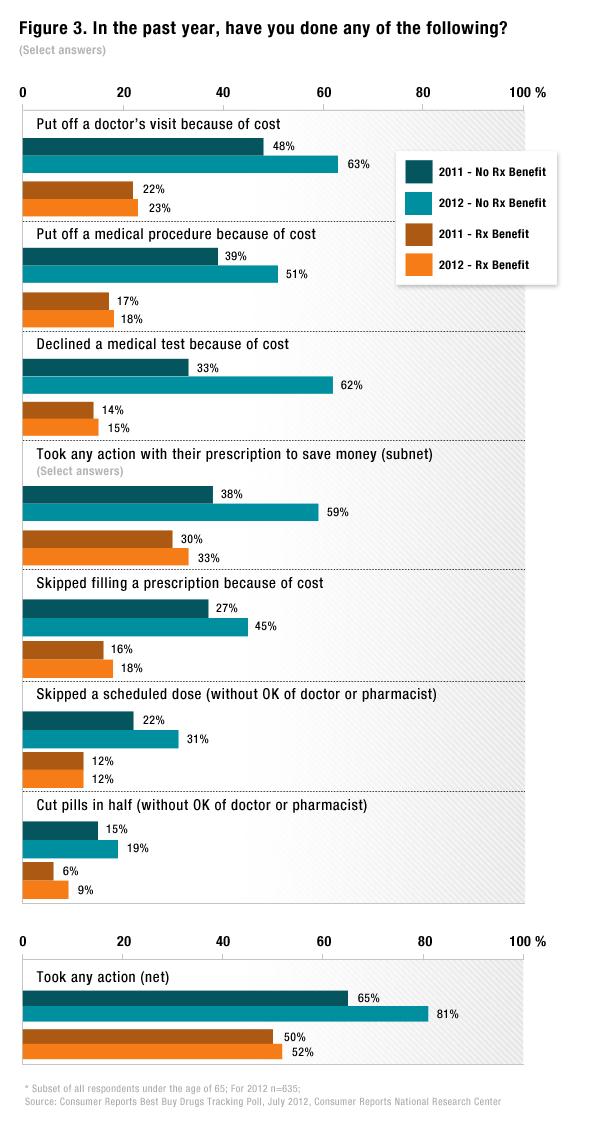by PharmacyChecker.com | Sep 27, 2012 | Drug Prices, Medication non-adherence
New data from Consumer Reports shows that 67% more adults without prescription benefits under the age of 65 skipped filling a prescription due to high drug prices this year compared to last year. In 2012, 45% of respondents reported they did not fill a prescription due to cost, up from 27% in 2011.

Consumer Reports Best Buy Drugs Tracking Poll, July 2012,
Consumer Reports National Research Center. Click to enlarge.
These results should not be surprising. Many Americans aged 50-65 who lost their jobs during the recession also lost their health insurance. This age group has also had the most difficulty finding work after losing their jobs during the recession. These Americans are not yet eligible for Medicare Part D, which helps reduce prescription drug costs.
Alarmingly, the majority of respondents (both insured and uninsured) to the Consumer Reports survey said that they reduced other household expenses in order to pay for medications. Eighty-four percent of uninsured Americans reported a change in behavior in order to pay for medication. The number of insured Americans reporting a change is also high, at 59%. Budgets for groceries decreased, payment of bills postponed, and credit card payments increased: all because of the high cost of medication.
If you are struggling to pay for medication, keep the following in mind when about to purchase medication. Look for generic alternatives to brand name medications in the United States. Look for drug discount cards or coupons if you are purchasing medicine at a local pharmacy. If there’s no generic alternative, you can look for international online pharmacies and often find savings of 90%. Just make sure they are verified and safe, such as those listed on PharmacyChecker.com.
Tagged with: Consumer Reports, Drug Prices, Medication Adherence, pharmacychecker.com
by PharmacyChecker.com | Oct 3, 2011 | Drug Prices
Last week, Roger Bate, an economist and expert in counterfeit drugs with the American Enterprise Institute, wrote an article called “Google’s Ad Freedom Wrongly Curtailed.” Bate’s piece shows how banning safe foreign online pharmacies from advertising on Google and elsewhere is not only unethical but will lead to sub-optimal health outcomes. As we wrote at the end of August, the non-prosecution agreement between the U.S. Department of Justice (DOJ) and Google, in which the search engine was fined $500 million for allowing rouge Canadian sites to advertise controlled substances, is good because it forces Google to now block dangerous rogue online pharmacies from advertising. At the same time, however, it’s bad because it appears to prevent Google from allowing safe and affordable Canadian-based online pharmacies form advertising as well.
The DOJ/Google settlement appears to reflect the false rhetoric espoused by the U.S. government and pharmaceutical industry that only U.S. online pharmacies can be safe. Bate knows this is not true based on his own empirical studies, which found that properly credentialed non-U.S. online pharmacies sell genuine medication at a lower cost and require a prescription. By blocking safe Canadian pharmacies from advertising to Americans on Google, it is more difficult for needy Americans to find them. Bate writes:
Google’s current policy removes the potentially lethal sellers, but by disallowing credentialed foreign sites from advertising it will harm public health. The tens of millions of uninsured Americans who cannot afford their drugs will go online to circumvent this obstruction. If they are unaware of pharmacychecker.com’s credentialing, they will play Russian roulette and may end up buying a lethal product.
With media outlets and politicians inundated with a voracious pharmaceutical industry public relations assault that seeks to paint all non-U.S. online pharmacies as rogue, the victim here is the American seeking affordable medication online because he or she can’t afford it here at home. Bate wrote: “What is surprising is that independent groups, like Consumer Reports and AARP, have bought into this industry rhetoric or have failed to properly explain to their members that foreign doesn’t necessarily mean dangerous.” (more…)
Tagged with: AARP, adSense, advertising, AEI, American Enterprise Institute, Americans, Canada, Canadian pharmacies, Consumer Reports, controlled substances, Department of Justice, DOJ, Google, Online Pharmacies, pharmacychecker.com, Roger Bate, rogue pharmacies, safe pharmacies, United States



